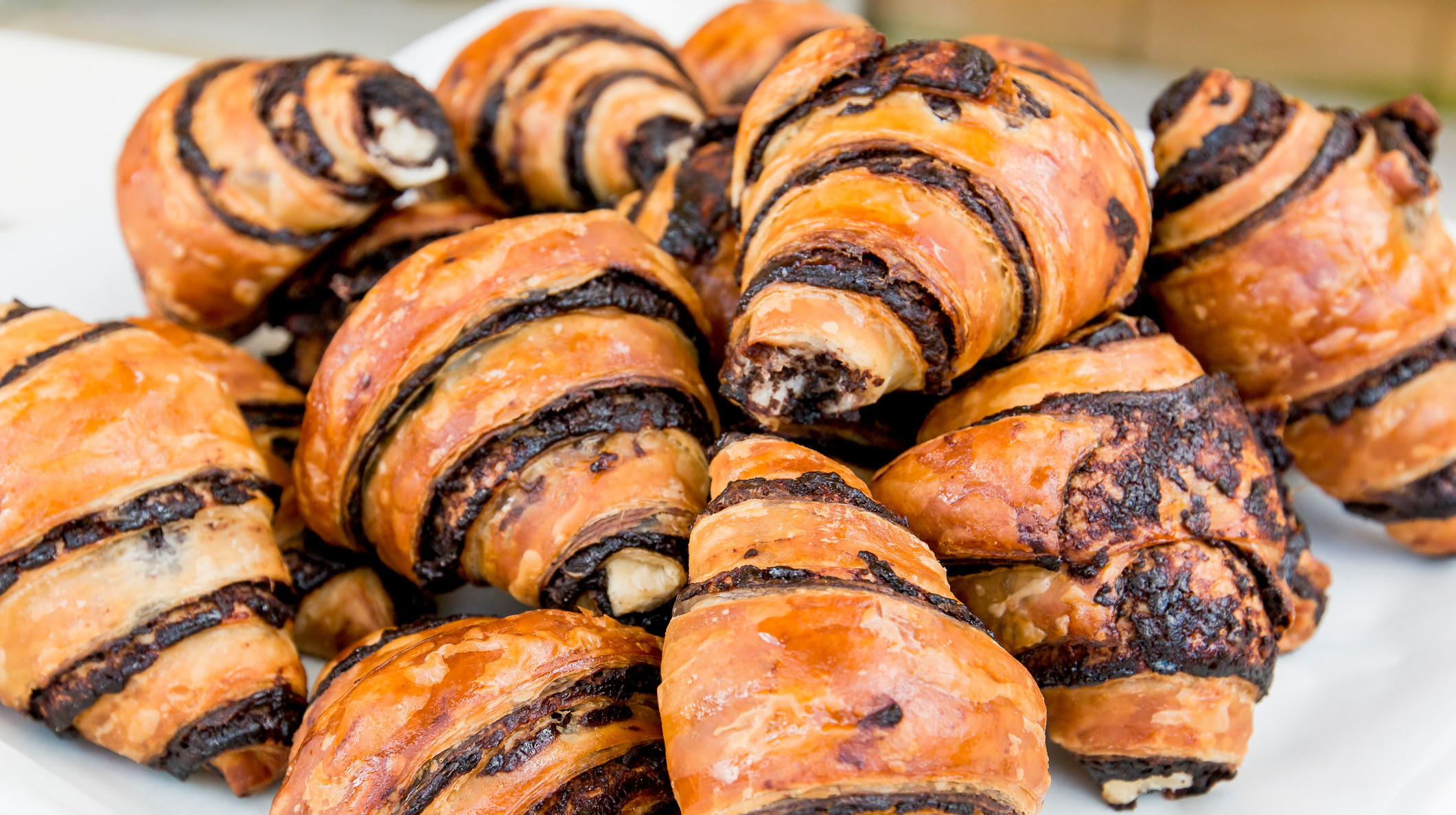You Can Never Eat Just One Rugelach
Rabbi Ed Feinstein, senior rabbi at Valley Beth Shalom in Los Angeles and a lifelong Jewish pastry expert, says if a hand-sized Danish is a meal, a rugelach is a snack. He should know, since, growing up, he and his younger brothers were the taste-testers at Plaza Bakery, their father's Jewish bakery in the San Fernando Valley. (It is now closed.)
"We just loved chocolate," he remembers. "Serious chocolate chips or it wouldn't pass. [It had a] combo of cinnamon and chocolate chips and yellowy-white streusel on top, like cake with a lot of butter."
But Feinstein is probably in the minority that knows you can't have one rugelach: I don't mean they're too delicious to eat just one (which is true), but that singularly, it's a rugel.
Rugelach is like Hanukkah in that it's one of those words that isn't easily transliterated into English so you may find it spelled or pronounced rugelakh or roggelach or even rugula. If this helps, think of the prefix a- meaning not, so rugula is the antithesis of arugula with a guttural "ch" at the end. The name means "little twists" in Yiddish and each one is a small bite-sized pastry—two bites for those with will power—that's essentially a triangle of dough rolled around a sweet filling (commonly chocolate but all manner of preserved fruits, nuts, and spices can be found) forming what looks like a tiny croissant. That said, the treat predates Viennoiserie pastries, so don't think of rugelach as denser, tiny croissants but croissants as lighter, larger rugelach.
The Jewish high holidays—Rosh Hashanah, aka the Jewish New Year, and Yom Kippur, the Day of Atonement—are the high season for rugelach orders. Not that they aren't immensely popular at Hanukkah, Bar Mitzvahs, Shabbat, and all days where a morning cup of coffee is called for. But the high holidays are when Jewish families gather for celebratory meals, and, as Rabbi Feinstein notes, "eating [rugelach] on your own is no fun."
No doubt fans of pain au chocolat, or chocolatine, would enjoy rugelach, but the morsel originated in Eastern Europe, specifically Poland, spread wide among Jewish communities as far away as Hungary, and followed the Diaspora to America. This is why it's a staple at every Jewish bakery and deli around each New York borough—but predominantly Brooklyn—and clear across the country to Los Angeles.
What's interesting about rugelach recipes is how there are two major varieties, split along religious lines. There's an old joke about how if you get two Jews in a room, you'll get three opinions, so why should the recipe for rugelach be any different? The traditional recipe calls for dough made not just with flour, sugar, eggs, yeast, and butter, but cream cheese, too, which makes these rugelach more decadent. But kosher laws don't allow for foods made with dairy to be enjoyed at the same time as meat. So there's also parve rugelach—non-dairy for kosher purposes—in which bakers replace the butter and cream cheese with oil (and use separate equipment, mixer and all).
Andres Izsak was born in Hungary and was only 11 when the Nazis invaded. Izsak made his way to Uruguay—a popular destination for Ashkenazi Jewish refugees—and got married and had five children there. The Izsak family eventually resettled in New York, which is how Andres and one of his sons, Abraham, came to buy a bakery in Brooklyn's Midwood neighborhood in 1985. Their eponymous bakery, Isaac's Bake Shop has been churning out some of NYC's most beloved rugelach ever since. The bakery's babkas are pretty special, too. And such a marble cake you've never tasted!
"The marble cake is one of a kind," says Abraham in a Yiddish accent as thick as shmear. "But if you want to have a nosh, pick up a Danish or some rugelach. The chocolate and cinnamon are the hottest ones."
While Midwood is largely an Orthodox Jewish neighborhood, the bakery is directly across from Di Faro Pizza, and the long lines outside are made up of folks from all over, including those who'd never heard of rugelach before but now enjoy them as a pre-pie snack.
In Los Angeles, the faces of rugelach makers are changing. "Jewish kids like me went off to college to become lawyers and doctors and rabbis," reflects Rabbi Feinstein. "So my father and those guys"—the owners of Jewish bakeries such as Schwartz's and Canter's—"trained Latino men, wonderful guys." Today, these are the people manning the mixers.
Rabbi Feinstein saves his highest praise for Marzipan Bakery in the Mehane Yehuda Market in Jerusalem. "These people make rugelach like my dad did,' he says. "When the Messiah comes to redeem the world, he's gonna get a box beforehand because they're that good." Feinstein has been known to ask his hotel concierge to procure him a box when he doesn't have time to wait in line, which frequently extends around the entire market. (You can find an attempt to recreate the recipe here.)
But the deliciousness of rugelach isn't the only reason they're found at every Jewish gathering from Shabbos to shiva. "We're a people that like to share life and have conversations," explains Rabbi Feinstein. "Rugelach is part of this. You sit down, brew a pot of coffee, and polish off a box of rugelach. They're nourishment for the soul. Both celebrations and tragedies, you share something sweet while sharing memories."
